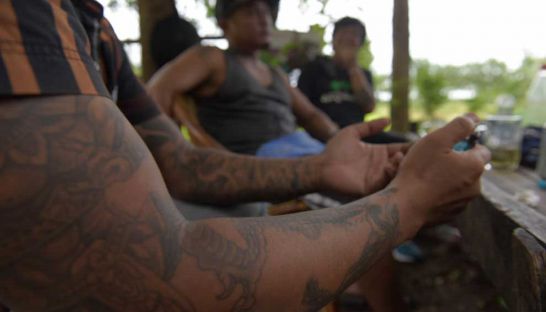Cambodian government to reopen pipeline for US deportees
Cambodia is preparing to accept deportees from the US again, reversing course after more than a year of diplomatic back-and-forth, Interior Ministry spokesman Khieu Sopheak confirmed yesterday.
According to Sopheak, the Cambodian government “expects to receive a positive response” from the United States in return – specifically, the lifting of visa sanctions that were imposed on high-ranking Ministry of Foreign Affairs officials in August.
“We don’t want to break the relationship between the US and Cambodia,” Sopheak said. “We want to continue our cooperation.”
US Embassy spokesman David Josar declined to comment yesterday, directing questions to the Department of Homeland Security. DHS spokesman Brendan Raedy said in an email that the US “continues to work with the Government of Cambodia to establish reliable processes for the issuance of travel documents and their acceptance of the prompt, lawful return of Cambodian nationals who are subject to removal from the United States”.
The US has so far deported more than 560 Cambodians convicted of felonies to the Kingdom under a repatriation agreement signed in 2002. The practice has been criticised for being unjust to deportees, most of whom arrived in the US as refugee children fleeing the Khmer Rouge and are lawful permanent residents of the US. Many have never been to Cambodia, and were convicted in their youth only to be rounded up for deportation years later.
Article continues after this advertisementBill Herod, founder of the Returnee Integration Support Center in Phnom Penh, yesterday confirmed the NGO “is expecting and preparing for new arrivals”.
Article continues after this advertisement“The people involved here are not citizens of the US, they are citizens of Cambodia, and Cambodia has an obligation under international law to accept the return of its own citizens,” Herod said. “None of this is fair or just or moral or ethical, but it’s the law.”
Cambodia’s decision to stop issuing travel documents for deportees last October sparked a yearlong dispute that resulted in the US suspending certain visas for top Foreign Affairs Ministry officials, and Prime Minister Hun Sen pulling Cambodia’s support for a programme to find and repatriate the remains of American servicemen who disappeared in the Kingdom during the Vietnam War.
The issue also became a talking point for Prime Minister Hun Sen, who criticised the deportations as inhumane and the US for what he described as its hypocritical approach to human rights.
Asked why the Cambodian government changed course after repeatedly characterising the deportations as a violation of human rights, Sopheak said human rights were “not in the interest of the whole nation”.
“Put the interest of human rights on one side and think of the interest of the whole nation on the other side,” he said.
According to Sopheak, the government is prepared to begin interviewing detained Cambodians slated for deportation and will take the process “step by step”.
The Kingdom’s change of heart throws into question the fates of more than 100 Cambodians detained by US Immigration and Customs Enforcement in a series of recent raids that immigration advocacy groups say were unprecedented in size.
The news is also likely to put a kink in a class action lawsuit filed by civil rights organisation Asian Americans Advancing Justice late last month on behalf of Cambodians who have previously been detained and released by US immigration officials, but were either returned to detention or face that possibility.
Lawyers for the group are arguing that the US was violating the rights of those Cambodians by detaining them without any evidence that the Kingdom would accept them.
SUNY Buffalo School of Law professor Rick Su, who studies immigration policy, said the success of the lawsuit turns on whether the court believes Cambodia will accept the detainees.
“The Supreme Court has said that the government cannot detain someone indefinitely if there is ‘no reasonable likelihood’ that he or she can be removed,” Su said in an email, before hearing of the Cambodian government’s change of policy. According to Su, detention of longer than six months “would be problematic unless the government had another reason to continue to detain an individual”.
Cambodia is among four countries – the others being Eritrea, Guinea and Sierra Leone – that were subjected to visa sanctions by the US for “denying or unreasonably delaying” the return of their citizens.
Sierra Leone agreed to accept 27 deportees on an emergency basis shortly after the sanctions were announced in September.
